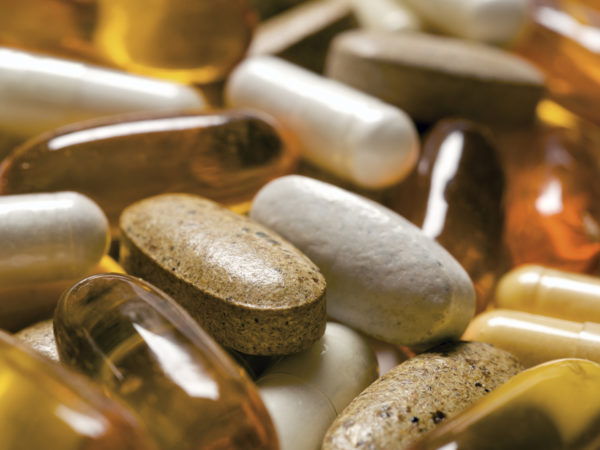Are Vitamins Dangerous?
Someone just sent me an article from The New York Times that said experts are concerned that Americans are taking so many vitamins and minerals that they may actually be increasing the risk of disease. Do you agree?
Andrew Weil, M.D. | June 6, 2003

I’ve been asked a lot about that article. Frankly, I saw nothing new in it, but I did see some information that I think is misleading. For those of you who didn’t read it, the article quoted several experts who voiced concern that Americans are taking too many vitamins and minerals are getting even higher amounts from fortified milk and other foods and that the combination of these high levels could lead to health problems. Here’s a rundown:
- Vitamin A: Excessive intake – usually above 10,000 IU per day for adults – can lead to hair loss, confusion, liver damage and bone loss. Instead of taking vitamin A, I recommend mixed carotenoid supplements, which are derived from vegetables that include beta-carotene, lycopene and lutein from which the body can make vitamin A. Even in high doses, carotenoid toxicity is rare, and is usually limited to yellowing of the skin.
- Iron: One expert quoted in the Times article worried about iron overload. This is a real concern. Unless you’re a menstruating woman, do not take iron supplements unless advised to do so by a physician after tests have revealed iron deficiency anemia, and the source of blood loss has been identified.
- Folic Acid: The Times article mentions conflicting studies on whether taking folic acid reduces the risk of heart disease. One study showed that it was beneficial because it lowered levels of homocysteine, an amino acid associated with an increased risk of heart disease. Women of childbearing age who may become pregnant need adequate folic acid to prevent certain birth defects. I continue to recommend a supplement containing 400 mcg of folic acid daily.
The Times article also referred to a number of studies linking antioxidant vitamins with increased rates of various diseases. The participants in these studies already were ill or were at risk of serious disease because they smoked. In one, a large study of vitamin E and heart disease, findings that the rate of hemorrhagic strokes increased were not surprising given the fact that vitamin E has anticoagulant activity. I know of no study findings suggesting that vitamin supplements are responsible for an increased risk of disease among healthy people. My recommendations for daily vitamin E are to take 400-800 IU of natural mixed tocopherols, or at least 80 mg of natural mixed tocopherols and tocotrienols.
The Times‘ experts made a point that I have tried to get across repeatedly for years: taking vitamins, minerals and other dietary supplements will not make up for an unhealthy, unbalanced diet lacking in the fresh fruits and vegetables. Supplements are best viewed as insurance against gaps in the diet and against increasing toxic pressures from the environment.
Andrew Weil, MD









